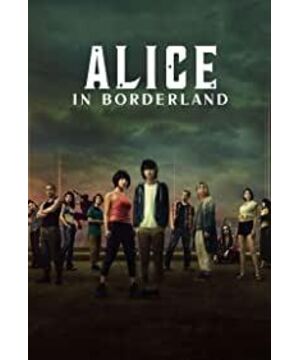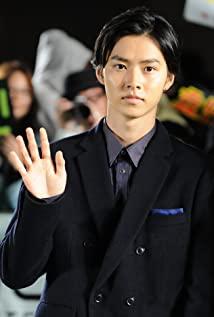Individuals are politics, culture is nothing, seek advantages and avoid disadvantages, and achieve the same goal by different paths, you and I are both in the game.
Generally speaking, there are two aspects that are more attractive. One, the story . A group of escapist people have to participate in a series of life and death games in order to survive in a sci-fi alien world after the real social order suddenly disappeared. But one has to ask, why did all this happen, and where did it lead people? Between the law of the jungle and the morality of human nature, how exactly should we be? Second, in form . The film is set in a different world of science fiction, with the main line of breaking through the game and gaining survival. It is full of blood, conspiracy, fear, hormones, fights, gunfights, and cold humor. The first three episodes rely on the complete narrative of the breakthrough and integrate the above elements, which is enough to keep the audience in front of the screen. But if it stops here, I am afraid it will not be a masterpiece of Netflix, and it still depends on the metaphors of human nature, politics and culture. Thirdly (there are only two aspects?) The performances of the male and female protagonists are awkward for a while from time to time... In contrast, the other supporting roles appear very natural and plump.
Some metaphors from the story:
1. A half-baked thread in the story: the individual is politics. One, the war of all and all. Before reaching the seaside utopia, people and people randomly met, formed teams, passed levels, and sacrificed to each other because of the game. In fact, it is saying that in the original state of disorder, everyone has specific interests (for love, for work), and these interests are the driving force for their survival. Although there are so-called affection and morality, deep down in human nature, we always put our own interests first. This still ends up in a war between what Hobbes called "all against all", in which all rhetoric about justice, morality, good and evil is reduced to a tool to ensure one's own survival. Second, religion . In this intriguing, life-and-death contest, whether it is the winner or the victim, there is a question in their minds: What is all this about? There is also a desire: to return to normal order. In the film, religion takes the lead. The male protagonist Arisu's hard-working technology full-time workers did not believe in religion at first, and even felt a little disgusted because of his mother (witnessed his mother's devotion when he was a child, and his mother frequently borrowed money when he was an adult), but he finally got burned in his calf and fell into fear and despair. Time to pray. In fact, the hidden philosophy of the Dark Ages of the Middle Ages and Christianity, which was born during the Israeli War, also began in this way. In the last game, "Punish the Witch with Fire", it appears to be some kind of religious ritual. When people lose their minds in the face of fear and the unknown, their behavior will more or less always return to religion. Third, the country. People's fear of bloodshed means a desire for order and safety. Therefore, there is a rationality for the emergence of a seaside utopia. The seaside utopia does a series of things that proves it is a political metaphor: ① monopolizing violence, on the one hand it can be seen that this is enough to reconcile the "war" between any other people, and the original state of all people and all people. The war between them disappears; but the bad side can be seen, this is the means of violent rule. ② establish a political alliance. A small group of capable people become the cadres of Utopia. ③ A set of ideology was established, and the ruler made up a set of beliefs (you can return to the normal world by collecting all cards), and preached for the benefit of all game players (escape from the country together), with the purpose of calling players to submit to s collect playing cards. ④ Pursue the policy of ignorance of the people, provide a comfortable living environment, and adequate entertainment, sex and other pastimes, and root ideology and the worship of rulers in consciousness. We can see that most players live in such a utopia without anxiety, they seem to forget that this is not a normal world. But for them, there is food, drink and women, so why bother to think about other things? Fourth, the ruler. In fact this is an extension of the third point. We see a set of ideologies established in the seashore, but this set of ideologies works through a path of rulers-political alliances-violent institutions-all players. What happened in each of these links, which led to the full spread of this ideology? ①The foolish players believe that it is because they live comfortably and have no intention of thinking, and they dare not raise objections even if they are deterred by force. ②The violent organization, its leader Su Guo, is a good friend of the ruler, and the two are openly in conflict, so the violent organization supports this ideology. (Of course, this is not reliable, and it has not laid a foreshadowing of the subsequent Su Guo rebellion) ③ Political alliance. The ruler has established a power promotion system internally (ranked according to the number of cards obtained, enjoying the position of inheriting the throne and escaping the country), and maintaining it through personal prestige and moderate violence. After all, everyone in the political alliance understands that freedom can only be won by assisting the ruler. ④ The focus is on the ruler. In the film, the dialogue between the ruler and the state of Su is given many times. "In this hopeless world, only by giving hope to despairing people can we keep moving forward. If there is no hope, build one by ourselves." It can be seen that the rulers truly believe in this set of ideologies that come from themselves. Or really have to believe it. On the positive side, maybe he does have some kind of political ambition: to keep people alive with hope. That's why this belief system has been rolled out across the board: true belief in the rulers - aided by political alliances - violent repression - acceptance by the foolish people. Fifth, return to chaos . The death of the ruler means the disintegration of ideology and the ruling order. Back into the primordial state of disorder, back into the war of all and all. Who will win this time? Of course it is the stronger side.
2. A dark thread in the story: Culture is a bubble . In the film, the heroine and father like to climb mountains, because only mountains can accept their truest selves. The man with a long knife covered in tattoos records the explorers to the North Pole on his blog and explains that actually walking towards death is also a cry for freedom and life. After the end of the last game, the voice-over narration of the male protagonist said things like culture such as bubbles. This clue is obscure, but important. Nature brings permission, culture brings taboo . A sociological view holds that human beings live in a dual reality, one of the natural, physical reality, and the other a reality constructed from the imagination. The latter is the so-called local culture. ①Culture is an intersubjective concept . The value of paper money is not because of its own value, but because it is widely believed that this piece of paper with numbers written on human heads can be exchanged for bread and cars. This concept that does not exist in nature, does not disappear due to unbelief, and exists widely among subjects is the cultural reality we have constructed. ②The existence of culture has taboos and prejudices . People are born with an LGBT community, but different cultures have different levels of acceptance. This kind of cultural prejudice is deduced to the extreme, which is social discrimination, group bullying, religious and ideological persecution, and even religious war. In fact, this is another epitome of "individuals are politics". People often look down on each other, even argue, and even go to war because of their different ideas about the same thing. ③Culture is like a bubble, to get rid of culture is to gain reality . After knowing that cultural reality is constructed and that culture is destined to have its own taboos, it is not difficult to understand why the heroine's father loves mountaineering, and why the Arctic explorers take the initiative to die, because breaking away from culture and returning to nature is freedom.
3. You and I are both in the game. In real life, sociology tells us that culture is constructed based on imagination, and culture is a dream bubble, but we are still tired from work, heartbroken for love, anxious and painful but still lingering on. Since culture is like bubbles and not real, why don't we give up our efforts? The male protagonists Arisu escape from reality and come to a different world full of sci-fi. It is another set of rules, another set of orders, and another dream bubble, but they still have to live and die and eat the weak. Since this is an unreal world, another fantasy bubble, why don't they give up resistance? In the game of "hide and seek", players such as arisu are the players. But the "horse ghost" who shot and killed them was also in the game. From arisu's narrative perspective, they won. But if this film is developed from the perspective of "horse ghost", I am afraid it will be another story, a story of failure to participate in the game of life and death. arisu is committed to finding the operators of the game, thinking that they are the people who make the game. But the operator's base camp that was finally found was full of corpses. These corpses are also players, players who have failed the mission. A sociological view holds that people's social activities are a series of "role plays": a mother is called a mother, not because she has had children. It's because she gave birth to a child, breast-feeding him, taking care of the child's diet, working hard for his studies... and so on, a series of behavior scripts that satisfy this "role". By extension, a teacher, a student, an entrepreneur, a waiter, a beggar... all have specific behavioral patterns, and they have a role play that is limited by culture. They must play this role well before they can be called it. To be a teacher, a student, an entrepreneur, a waiter... The culture we have created by chance imagining regulates how various roles should behave. If you want to escape from reality, go from being a good student to being a bad student. All you have to do is talk, smoke, and fight in class. But just when you smugly think you've jumped out of reality, you pick up a "bad student" character script. The people who go to another world in the film are all escapists, arisu escapes reality, the heroine escapes from her father, the tattooed man escapes himself without social interaction and sense of existence, and there are people who escape his gender... These people always It would be nice to complain casually, "If you go to...go to...the place...change the environment". But in fact nothing will change, you just jump from one role to another briefly, the cultural bondage is difficult to get rid of, unless you choose to die; but as long as you are still in the cultural environment, as long as you are unwilling to face yourself, Difficult to turn things around. The story ends and your face is reflected on the black screen. You play the role of an audience, an audience hungry for thrills and rewards. You close the screen, talk to a friend, and you move from being a spectator to being a friend. From one game to another. Do you also want to ask, why is this? What exactly should be done? When you ask this question from the heart, it is the beginning of the so-called "absurdity" of Camus' The Outsider.
Everything is like a dream bubble.
View more about Alice in Borderland reviews











